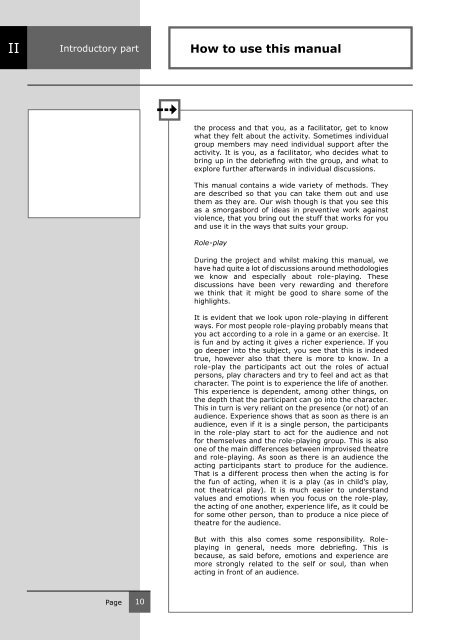Who are you? - Emergency Brake
Who are you? - Emergency Brake
Who are you? - Emergency Brake
You also want an ePaper? Increase the reach of your titles
YUMPU automatically turns print PDFs into web optimized ePapers that Google loves.
Methods<br />
Description Introductory part<br />
Sheet<br />
II How to use this manual<br />
Page 10<br />
the process and that <strong>you</strong>, as a facilitator, get to know<br />
what they felt about the activity. Sometimes individual<br />
group members may need individual support after the<br />
activity. It is <strong>you</strong>, as a facilitator, who decides what to<br />
bring up in the debriefing with the group, and what to<br />
explore further afterwards in individual discussions.<br />
This manual contains a wide variety of methods. They<br />
<strong>are</strong> described so that <strong>you</strong> can take them out and use<br />
them as they <strong>are</strong>. Our wish though is that <strong>you</strong> see this<br />
as a smorgasbord of ideas in preventive work against<br />
violence, that <strong>you</strong> bring out the stuff that works for <strong>you</strong><br />
and use it in the ways that suits <strong>you</strong>r group.<br />
Role-play<br />
During the project and whilst making this manual, we<br />
have had quite a lot of discussions around methodologies<br />
we know and especially about role-playing. These<br />
discussions have been very rewarding and therefore<br />
we think that it might be good to sh<strong>are</strong> some of the<br />
highlights.<br />
It is evident that we look upon role-playing in different<br />
ways. For most people role-playing probably means that<br />
<strong>you</strong> act according to a role in a game or an exercise. It<br />
is fun and by acting it gives a richer experience. If <strong>you</strong><br />
go deeper into the subject, <strong>you</strong> see that this is indeed<br />
true, however also that there is more to know. In a<br />
role-play the participants act out the roles of actual<br />
persons, play characters and try to feel and act as that<br />
character. The point is to experience the life of another.<br />
This experience is dependent, among other things, on<br />
the depth that the participant can go into the character.<br />
This in turn is very reliant on the presence (or not) of an<br />
audience. Experience shows that as soon as there is an<br />
audience, even if it is a single person, the participants<br />
in the role-play start to act for the audience and not<br />
for themselves and the role-playing group. This is also<br />
one of the main differences between improvised theatre<br />
and role-playing. As soon as there is an audience the<br />
acting participants start to produce for the audience.<br />
That is a different process then when the acting is for<br />
the fun of acting, when it is a play (as in child’s play,<br />
not theatrical play). It is much easier to understand<br />
values and emotions when <strong>you</strong> focus on the role-play,<br />
the acting of one another, experience life, as it could be<br />
for some other person, than to produce a nice piece of<br />
theatre for the audience.<br />
But with this also comes some responsibility. Roleplaying<br />
in general, needs more debriefing. This is<br />
because, as said before, emotions and experience <strong>are</strong><br />
more strongly related to the self or soul, than when<br />
acting in front of an audience.


